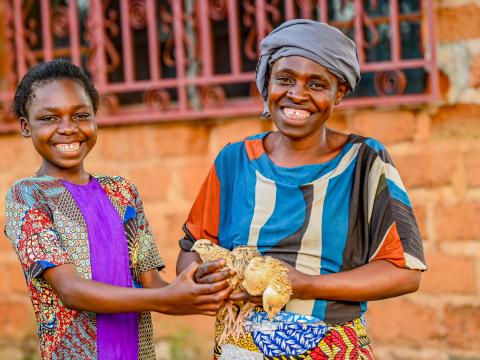DR Congo: Quail farming transforms the lives of vulnerable families and sponsored children

By Tatiana Ballay _ Communications officer WV DRC
Likasi, a friendly town in the south of the Democratic Republic of Congo, has recently become home to a unique initiative: quail farming. From a handful of quails and a few cages to a flourishing business, the impact of this project on the local population is undeniable. In the streets of the Simba district, Ms Ilunga is making an inspiring climb towards sustainable development, resilience and prosperity.
Ilunga remembers the transformational quail farming initiative launched by World Vision. “In the beginning, I had doubts about the project”, she admits, recalling her past. “But thanks to World Vision's training, I was able to gain the confidence I needed to start farming. Today, thanks to the sale of quail eggs, we have a stable income that enables us to offer our family a dignified life”, she enthuses.
The benefits of quail farming are not limited to improved livelihoods, but also include the nutritional virtues of quail eggs. Ms Ilunga is a member of the Bukwashi association, a dynamic and dedicated organisation comprising fifteen members, including ten women, who have all benefited from World Vision's support. Thanks to their collective strength, they have managed to build a thriving farm housing a thousand quails, producing an impressive 2162 eggs a month for sale.
“Every week, more than twenty trays full of quail eggs are produced by our small farm”, explains Rosa, a member of the association. Each tray contains forty eggs, which sell for 1000 Congolese francs each (or USD 0.36 per egg). “This adds a substantial income to our association, which helps us enormously to manage our activities and diversify our sources of income. Many members of our association, including myself, are also involved in farming. The income from raising quails also supports our families,
In the town of Likasi, the choice of raising quails is changing the lives of many people, who have realised that this initiative requires fewer resources to be profitable. Ms Ilunga adds optimistically: “Raising quails is a much cheaper business than raising other poultry”.
Quail farming also has an impact on the health of the Likasi community. Quail eggs, known for their many virtues, help to combat various health problems. Quail eggs, which are often underestimated, are an excellent source of nutrients such as phosphorus and vitamins B1 and B2, and contain no cholesterol. They contribute to the proper functioning of the brain, the health of teeth and bones, and the protection of the digestive, nervous and cardiovascular systems.
Manda Joseph, a quail breeder, runs a quail breeding project. “Our aim is to carry out intensive quail breeding. My ambition is to breed quails in large numbers and market their eggs to help people with health problems, as quail eggs are renowned for their nutritional contribution to human health”, Said Manda. For Manda quail eggs are not just food, they are a real source of essential vitamins and minerals for her family.
“Since my father started quail farming, our lives have changed a lot”, says Ardi, 17, daughter of Manda.
This project has brought a change in the lives of beneficiaries throughout the community by encouraging a sustainable and profitable business, while improving the health of the inhabitants. Quails, previously seen as simple birds, are now a symbol of change, evolution, and, above all, hope for a better future.
In the community of Kikula, World Vision has supported 15 members of the Tujenge association, including 7 women. This assistance consisted of 10 bags of inputs to feed the young quails. These members also received 150 quails, including 120 females. This initiative directly benefits 32 children in the community, including 18 girls and 14 boys (21 boys and 10 girls are sponsored). In the community of Simba, 50 households have benefited from quails provided by the Bukwashi association in Kamatanda. In April 2024, these families received 1,000 quails to support the well-being of 276 children (including 133 girls), including 67 sponsored children (including 33 girls). To date, these quails have already produced 72 trays of eggs in the first phase, equivalent to a further 2,160 quails, and laying is continuing.